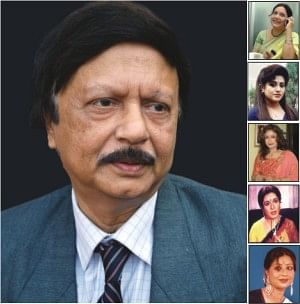Sohel Rana: My heroines

Sohel Rana's initiation into Bangladeshi filmdom happened as a producer in 1972 through the film “Ora Egarojon.” As an actor and director, his debut film was “Masud Rana” (1974). He produced the film as well. To date, he has acted in over 200 films and has been honoured with two National Film Awards. Among other recognitions are Bachshas, Zahir Raihan and Sher-e-Bangla awards and more. The veteran actor speaks about his leading ladies in this instalment of 'My heroines.'
Kabori: The way poetry subtly but indisputably brings out the true beauty of Bangla language, Kabori epitomises Bengali romanticism on screen. She's an actress of superior calibre. We've been paired in quite a few a films. Kabori is kind of 'moody' when it comes to punctuality. She'd arrive on the set around noon, even if it was her own production. Kabori didn't have much academic education but through her endeavours proved that she is capable of accomplishing a lot. We still maintain a friendly relationship and I enjoy our conversations. I recall us hanging out and chatting on the beach at Cox's Bazar after shooting. I consider her the best among actresses of our time. Among notable films that I've done with her are “Prem Bandhan” and “Gopon Kotha.”
Babita: Babita is another leading actress with whom I've worked in several movies, including “Gunahgar,” “Shukh Dukkher Shathi” and “Gherao.” She has worked in some films under my direction as well. Babita stands apart from other actresses of her time. I wouldn't call her arrogant or reclusive but she was not as laid back as Kabori. Babita is Babita, incomparable. Having said that, I recall her being somewhat impulsive.
Rozina: Rozina has this ability to lose herself in a character. Becoming 'Rozina' from Renu, she has come a long way through her determination and hard work. Her sincerity and devotion to her commitments helped her achieve the heights of stardom in our film industry. I respect her for these reasons. I remember casting her in my film “Mintu Amar Naam” and later recasting Babita in that role. I'm aware that Rozina was hurt by that decision. Years later, when I cast her in Parvez Films' production “Bidrohi,” she said, “I'm delighted that I'm getting an opportunity to work in your own production.”
Shabana: Shabana and I've been cast in several films. If Kabori was the symbol of vivaciousness, Shabana epitomised composure. She became the quintessential icon of the ideal, homely Bengali woman. On the set, she was equally amicable towards everyone. The whole cast and crew would be delighted when they heard that Shabana was doing the film. She threw none of the so-called 'tantrums' stars are typically accused of.
Shabnam: Shabnam and I had only done one film. Shabnam was one of the leading actresses in Pakistan. However, I found her to be quite down to earth when working together. I learnt quite a few things from this seasoned actress. Not everyone can embrace all the people around them; Shabnam has this quality.
Shuchorita: I've worked with Shuchorita in several films. Of them, I can recall “Jibon Nouka” at this moment. Shuchorita doesn't listen to orders or straightforward directions; she has to be coaxed into something. She has this ability to excel in emotional scenes. As a person, she was as real as one can be.

 For all latest news, follow The Daily Star's Google News channel.
For all latest news, follow The Daily Star's Google News channel. 



Comments